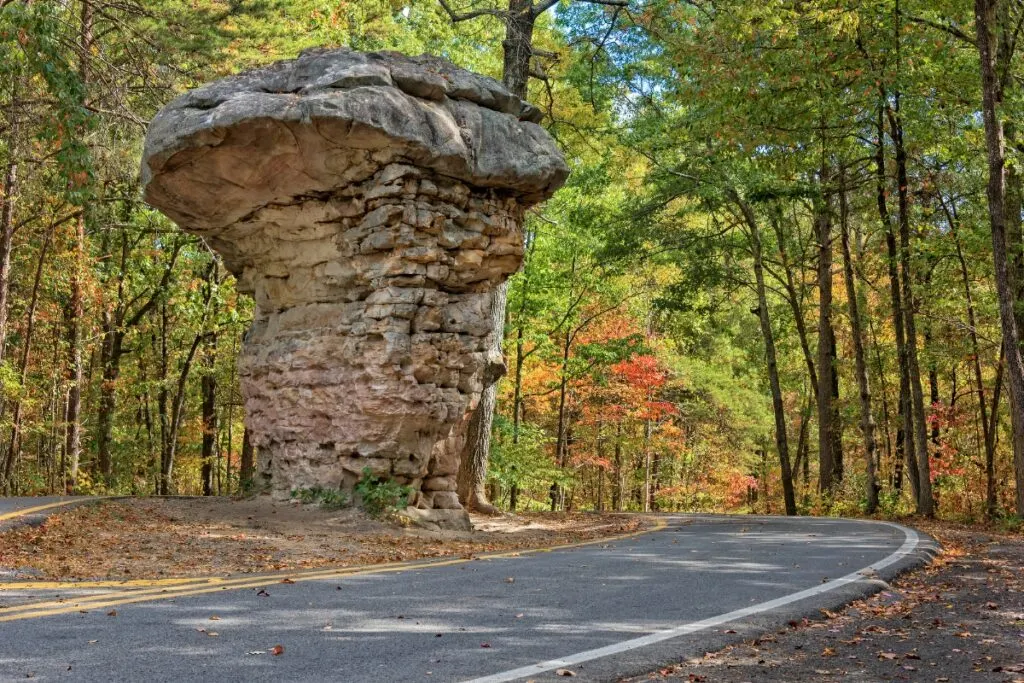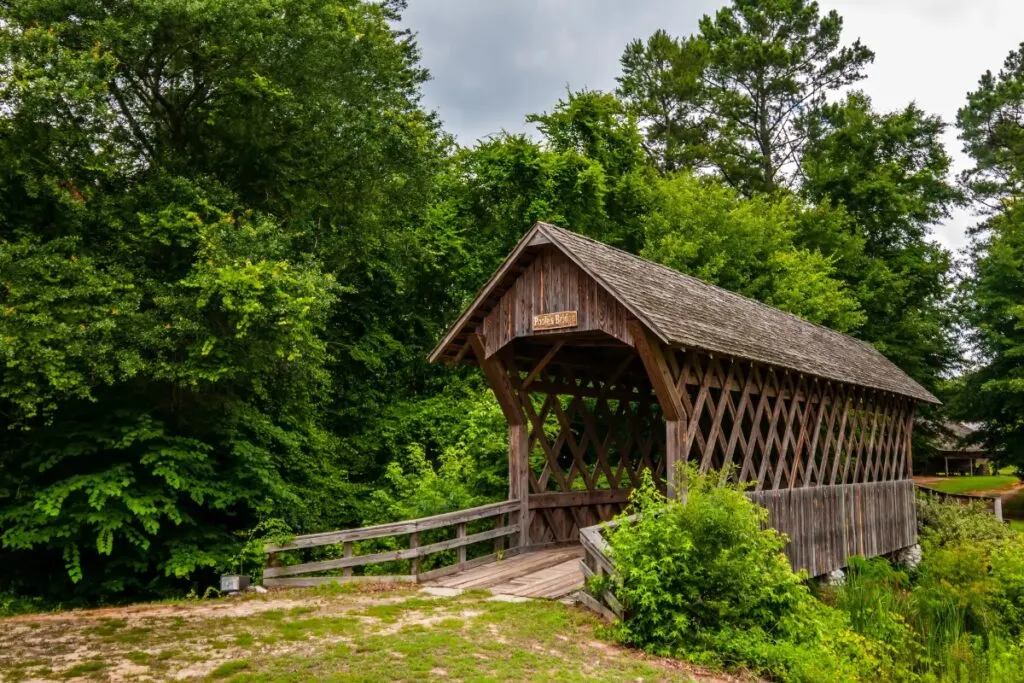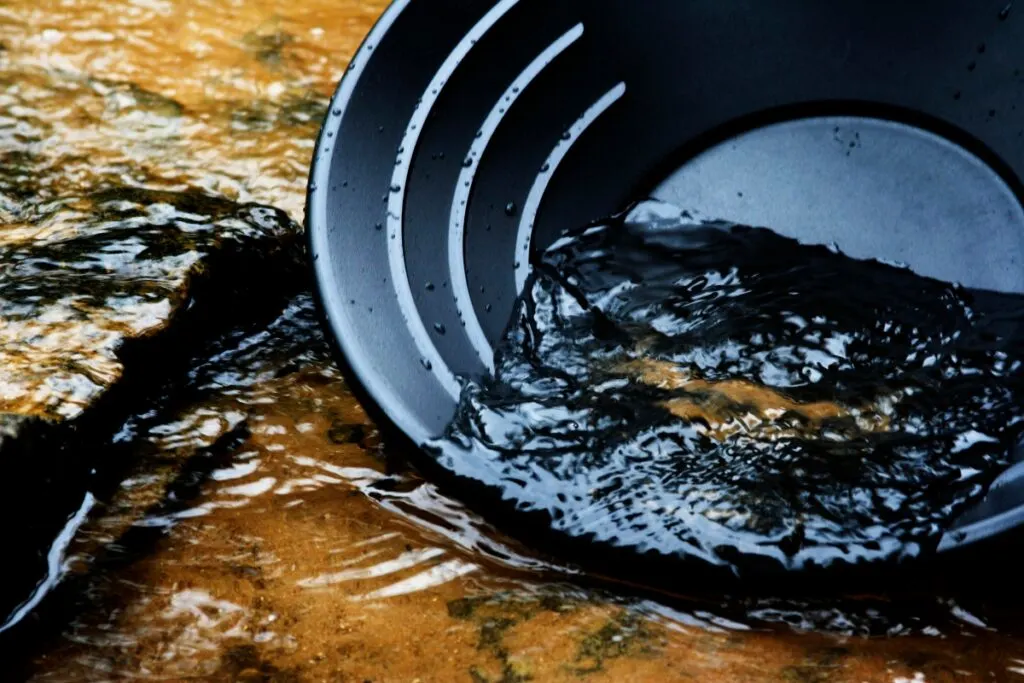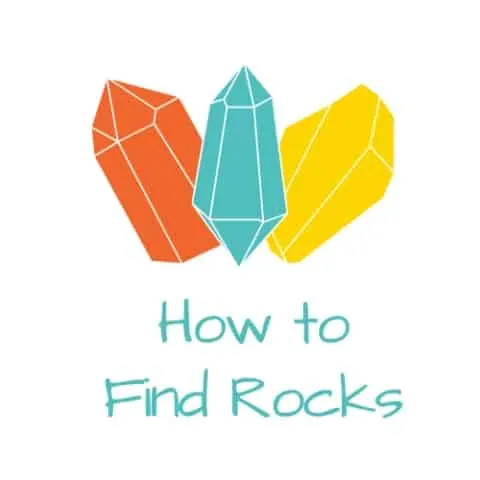As an Amazon Associate, I earn from qualifying purchases with no additional costs for you.
Alabama’s gold rush kicked off in the early 1830s when gold was first discovered in Chilton County. The rush started to peter out after a while; the shiny stuff was still out there, waiting for you to find it. Between 1830 and 1990, Alabama produced close to 80,000 ounces of gold.
As for the gold-bearing regions in Alabama, you might want to take a closer look at the areas near the towns of Arbacoochee, Goldville, and Lineville, where gold prospecting has quite the history.
The best gold prospecting locations in Alabama are:
- Talladega
- Tallapoosa County
- Clay County
- Coosa County
- Chilton County
- Cleburne County
- Randolph County
In this comprehensive guide, we’ll dive into the art of gold panning in Alabama, revealing seven of the best spots to search for this precious metal. Additionally, we’ll demystify the legal aspects of gold prospecting, ensuring your treasure hunt is both fun and law-abiding.

If you want to check out the best tools and equipment for gold prospecting, you can find them by clicking here (Amazon link).
The Legality of Gold Prospecting in Alabama
In Alabama, the situation surrounding gold prospecting is a bit complex. Gold prospecting, in general, is legal, but where and how you do it depends on a myriad of factors.
The process involves a good deal of research, adherence to property rights, and respect for the environment and the rights of others.
In Alabama, you’ll likely be looking at public lands; not all are open for prospecting. Your best bets are the areas managed by the Bureau of Land Management (BLM) or the United States Forest Service (USFS).
Not all lands managed by these agencies are open for prospecting. They must check their websites, maps, and district offices for specific information.
7 Best Places to Find Gold in Alabama
Alabama’s diverse terrain offers many opportunities for gold prospecting enthusiasts. Here are the top 7 best places to find gold in Alabama:
Talladega
Talladega is Located in the northeastern part of Alabama; Talladega is well-known for its gold-mining history. Gold was first discovered here in the 1830s, and since then, miners have extracted significant amounts of gold from the region.
Gold panners typically focus on Talladega Creek, where gold is often found in its waters and banks. The Riddle’s Mill area near the Creek is another favorite spot for gold panning. To find gold in Talladega, focus on the lower parts of streams where gold particles tend to accumulate.
TIP: Find out my recommended products if you are looking for the best tools you need to find gold (Amazon link):
- Gold Metal Detector: Bounty Hunter TK4 Tracker
- Gold Pan: Stansport Deluxe Gold Pan
- Sluice Box: Stansport Aluminum Sluice Box
- Shovel: Radius Garden Carbon Steel Shovel
- Snuffer Bottle: Stansport Snuffer Bottle
Tallapoosa County
Tallapoosa County is another prime gold-mining location in Alabama. The county’s history is rich with gold-mining tales, as it was one of the first places where gold was discovered in the state.
The Hog Mountain Mine in Tallapoosa County was once a bustling mining site, but it’s now primarily used by recreational gold panners. The most famous site is probably the Hog Mountain Mine, which saw its fair share of prosperity and tragedy.
With tales of fortunes won and lost, the area is infused with an air of mystery. To find gold in Tallapoosa, focus on the areas around old mines where gold may still be found in the soil and streams.
TIP: Check out the article below if you also want to know about the best rockhounding spots in Alabama:
Where to Rockhound in Alabama & What Can You Find
Clay County
Clay County is another spot where gold was discovered in the early 1800s. The Wesobulga Creek, in particular, has a long history of gold panning, and people have found many nuggets in its waters over the years.
Gold in Clay County is often found in placer deposits, which are concentrations of gold carried downstream by water and deposited in riverbeds and other low-lying areas.
To find gold in Clay County, focus on the areas around Wesobulga Creek, where gold has historically been found.
Coosa County
Coosa is Located along the Coosa River; Coosa County has a rich history of gold mining that dates back to the 1800s. Hatchett Creek and Weogufka Creek are two of the country’s most popular spots for gold panning. It’s now a favorite among gold panners.
Hatchett Creek and Weogufka Creek have long been known to harbor precious metals. To find gold in Coosa County, look for areas where the riverbed has been disturbed, as this can cause gold to accumulate in the sediment. Gold is often found in the crevices of rocks and the sand and gravel of riverbeds.
TIP: Before rockhounding in a new place, it’s helpful to have an idea of what rocks or minerals you can expect to see in the area. Check out the list of common rocks and minerals in Alabama below:
10 Common Rocks & Minerals You Can Find in Alabama
Chilton County
Chilton County, in central Alabama, is known for its gold-mining history. Gold was first discovered here in the late 1800s, and since then, people have been searching for gold in the county’s streams and creeks.
Gold panning in Chilton County is often done along the banks of the Coosa River, where gold has been found. To find gold in Chilton County, focus on the areas around the Coosa River where gold has historically been found.
Cleburne County
Cleburne County Located in the eastern part of Alabama, Cleburne County has a rich gold-mining history that dates back to the 1800s. Arbacoochee was once a bustling gold-mining center, and many miners flocked to the area in search of the precious metal.
Today, gold panners often focus on Chulafinnee Creek and the Potato Patch, where gold has been found. To find gold in Cleburne County, look for areas where the riverbed has been disturbed, which can cause gold to accumulate in the sediment.
Randolph County
Randolph County Located in the eastern part of Alabama, Randolph County is known for its gold-mining history. The Strawn Mine and Pinetucky Gold Mine are two historical mining sites where gold has been found.
Gold panning in Randolph County is often done along the banks of the Little Tallapoosa River, where gold has been found. To find gold in Randolph County, focus on the areas around the Little Tallapoosa River where gold has historically been found.
TIP: Simple gold panning is among the most allowed gold prospecting techniques you can use almost anywhere. Check out other effective methods in the article below:
The 7 Most Effective Gold Prospecting Techniques Explained
Active, Old & Abandoned Mines
These mines provide unique opportunities for gold prospectors and insight into Alabama’s rich mining history. Let’s explore notable mines throughout the state and identify their current status.
Red Mountain Iron Ore Mines (Old)
The Red Mountain, Iron Ore Mines, is Located in Birmingham, Alabama. From the late 1800s to the early 1960s, Red Mountain was the hub for iron ore mining. The iron ore extracted from these mines was vital for the Southern steel industry, especially during World Wars.
In the late 1800s, Alabama was more than just a Southern state; it was an iron ore goldmine! At the heart of it, all was the Red Mountain. Red Mountain was the nerve center of iron ore mining, shaping the American steel industry during the World Wars.
The mines are long closed, having given their all. Today, Red Mountain Park keeps the mining legacy alive with hiking trails and ruins of the mining era.
Brookside Coal Mine (Old)
The Brookside Coal Mine is Located in Brookside, Alabama. Brookside was a boomtown with a bustling coal mine owned by the Sloss Iron and Steel Company. Coal mined here fueled the blast furnaces that produced pig iron.
The coal mine has long been closed, but the town of Brookside is still there. The remains of the mine and mining community have been converted into a historical site.
Sylacauga Marble Quarry (Active)
The Sylacauga Marble Quarry is Located in Sylacauga, Alabama. The marble from this quarry is of such high quality that it’s been dubbed the “World’s Whitest.” It’s been used for various national monuments and architectural masterpieces.
Mining began in the 1830s and reached its peak during the 1960s. Although not as bustling as it once was, the Sylacauga Marble Quarry is still operational. It continues to produce high-quality marble for various applications.
Black Warrior Coal Basin (Active)
The Black Warrior Coal Basin is Located in Tuscaloosa, Walker, and Jefferson counties, Alabama. This is where coal mining in Alabama began.
Since the 1800s, the basin has supplied coal to fuel Alabama’s growth and industrialization. But some mines still dig deep and operate in the basin, extracting coal mainly for export.
TIP: Starting your gold prospecting journey depends on your seriousness and knowledge. Check out the ultimate guide on starting gold prospecting in the article below:
Ultimate Beginner’s Guide: How To Start Gold Prospecting
Gold Prospecting Clubs in Alabama

By joining one of these gold prospecting clubs in Alabama, you will gain access to valuable resources, meet fellow prospectors, and have the opportunity to explore and prospect in some of the state’s most gold-rich areas. Here are some prominent gold prospecting clubs in Alabama:
Weekend Gold Miners Prospecting Club
The Weekend Gold Miners Prospecting Club. This club is renowned for its family-oriented approach, which makes it a popular choice for gold prospectors of all ages. Established in 1982, it’s still strong and offers several gold prospecting sites in Alabama and Georgia.
Club members can pan, sluice, dredge and metal detect on these properties. The best part is that they organize monthly meetings where members can share their experiences, techniques, and treasures.
Gold Prospectors Association of America (GPAA)
The Gold Prospectors Association of America, the Alabama Chapter, is known for its dedicated members and active involvement in the gold prospecting community.
The chapter organizes monthly meetings where members can exchange ideas, learn new techniques, and plan future outings. It also hosts events, competitions, and educational seminars throughout the year.
If you’re looking for a well-structured, supportive community to dive into the world of gold prospecting, the GPAA Alabama Chapter is the place to be.
Piedmont Alabama Gold Prospectors Club
The Piedmont Alabama Gold Prospectors Club. Located in the heart of Alabama’s gold country, this club offers a great starting point for experienced and novice gold prospectors. The club’s properties are in the Talladega National Forest, known for its rich gold deposits.
Club members can participate in regular outings and also gain access to several gold-bearing streams in the area. Their friendly community is always ready to help newcomers find their first gold flakes.
TIP: Nothing in this world is impossible, and finding gold in your backyard is rare but can never be ruled out. Find out helpful tips in the article below:
Guide: PRO Tips On How to Find MORE Gold in Your Backyard
Gold Panning Tours in Alabama
Gold panning tours in Alabama provide an exciting and educational opportunity for individuals and families to learn about the state’s rich gold mining history and try their hand at finding gold. Here are a few popular gold panning tours in Alabama:
Alabama Gold Camp
The Alabama Gold Camp Is Located in the heart of Alabama. The Alabama Gold Camp offers a true, genuine gold panning experience.
This place is not just about gold panning. You can also try sluicing, dredging, and metal detecting. With 24-hour access to the grounds and equipment rentals, this place is a gold enthusiast’s paradise.
Gold Prospecting Adventures
The Gold Prospecting Adventures will take you back in time to the days of the gold rush. With knowledgeable guides, you will learn the tricks of the trade, from the basics of gold panning to advanced prospecting techniques. You get to keep whatever you find.
Frustration Hill Gold Mine Tour
The Frustration Hill Gold Mine Tour offers guided tours of an actual gold mine. You can get a feel for the life of a miner, learn about the history of gold mining, and, yes, pan for gold! This tour is a golden opportunity if you want an immersive gold panning experience with a touch of history.
TIP: The gold sluice box is a time-saving alternative to the traditional panning for gold. Check out helpful tips on using the sluice box correctly in the article below:
Find More Gold: Tips On How To Use Sluice Box Properly
Gold Prospecting Law: ls Gold Panning Legal in Alabama?

These laws are in place to ensure that gold prospecting activities are conducted responsibly and do not cause harm to the environment or infringe on the rights of private property owners. Here’s what you need to know about gold prospecting laws in Alabama:
Public Land and Private Property
There’s a critical distinction between public land and private property. While you’re technically free to pan for gold on public lands, private properties are a different ball game. You’re going to need explicit permission from the owner. And even if you get the go-ahead, there are still rules.
Navigating Alabama’s Regulations
Alabama’s Department of Conservation and Natural Resources (DCNR) oversees most recreational gold prospecting activities.
The DCNR stipulates you need a permit to pay for gold on state-owned lands. Certain areas may be off-limits, such as designated wildlife sanctuaries or archaeological sites, even with a permit.
Respecting Native American Land
It’s essential to know that some lands in Alabama fall under the jurisdiction of Native American tribes. You’ll need to seek permission from the respective tribal authorities if you plan to prospect on their land, respecting their customs and traditions is paramount.
Gold Prospecting Do’s and Don’ts
Gold Prospecting Do’s and Don’ts: The rules don’t end there. There are certain do’s and don’ts to remember while prospecting in Alabama.
For instance, you cannot use heavy machinery or large-scale dredging equipment. The state of Alabama encourages a “leave no trace” policy, which means you must clean up after yourself and minimize any environmental disturbance.
TIP: Gold panning is legal in the U.S. however, you must remember that every state has gold panning laws. Find out the complete guide on gold panning law in the article below:
Complete Guide: Is Gold Panning Legal & Where Can You Pan?
Tips on Getting a Gold Claim in Alabama
If you’re serious about gold prospecting in Alabama, you might consider taking a gold claim. A mining claim gives you the legal right to extract minerals from a specific area. Here are some tips for getting a gold claim in Alabama:
Understand the Gold Prospecting Scene in Alabama
You’re now part of a community that traces back to those adventurous prospectors. Get to know this community, learn about the most productive areas, and listen to tales from experienced miners. They can provide valuable insights into the best places to start your gold prospecting journey.
Research the Available Gold Claims
Gold claims come in two flavors: placer claims and lode claims. Placer claims are for unconsolidated materials that bear gold, like sand and gravel.
Lode claims, on the other hand, are for valuable mineral deposits in bedrock. Get a clear understanding of these types, and figure out what suits you best.
Once you have that down, look at the Bureau of Land Management (BLM) website or go to their office in Alabama. They maintain a list of open claims that you can check out.
A pro tip: Cross-check the available claims with topographic maps and records of previous mining operations to make informed decisions.
Claim’s Legal Status
Gold claims can overlap with private property or protected areas. Plus, there might be existing claims from other prospectors. You can use the BLM’s LR2000 system to verify the status of the land and ensure there are no legal issues.
Evaluate the Potential of the Claim
But don’t dive in headfirst without the right tools. Arm yourself with a gold pan, metal detector, and maybe even a sluice box if you’re feeling adventurous.
Test different spots and record your findings. Look for signs of gold, such as nuggets, flakes, or even fine powder, indicating a valuable gold deposit nearby.
TIP: In the article below, we have compiled the most common rocks and minerals you can find in Alabama, along with the best rockhounding locations for each one:
10 Common Rocks & Minerals You Can Find in Alabama
Stake Your Claim
If you’re confident about the claim’s potential, it’s time to stake it. Start by placing stakes at the corners of the area you intend to claim.
Then, head to the BLM office and file the necessary paperwork, including maps and descriptions of your claim. Don’t forget to pay the fees associated with claiming land for gold prospecting.
Gold Prospecting Club
Joining a gold prospecting club in Alabama can be a great way to learn about new claims, share knowledge with experienced prospectors, and even access exclusive claims reserved for club members. It can also provide valuable support and resources for improving your gold prospecting skills.
Respect the Environment and Local Communities
Remember to be a responsible prospector as you embark on this exciting venture. Respect the environment, local wildlife, and communities near your claim. Follow the principles of Leave No Trace and adhere to the regulations of the BLM and other relevant authorities.
Wrapping Up
When gold panning in Alabama, respecting private property and adhering to local laws and regulations is essential. Always get permission from landowners before accessing their property, and follow the rules set by local authorities.
Remember that finding gold requires patience and perseverance. While you may not strike it rich overnight, the experience of exploring Alabama’s beautiful landscapes and learning about the state’s rich history can be just as rewarding as finding gold. Happy prospecting!
TIP: You need to know how gold deposits occur to understand which rocks to look for when prospecting. Find out more in the article below:
5 Rocks You Need To Look For When Gold Prospecting (+ Why)
